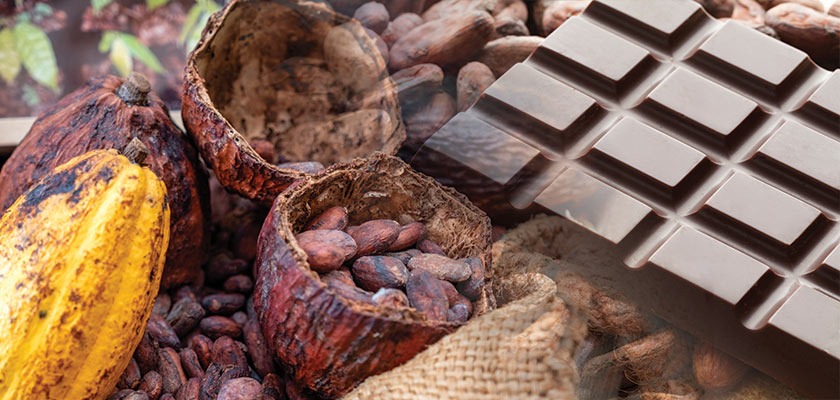HOW CLIMATE CHANGE IS AFFECTING COCOA FARMING AND THE FUTURE OF CHOCOLATE
Chocolate is more than a sweet indulgence. It’s a $100 billion global industry, a cultural staple, and a livelihood for millions of smallholder farmers across the tropics. But behind every silky bite lies a fragile supply chain rooted in one of the most climate sensitive crops on earth.
PHYSICAL TRADING
9/18/20252 min read


Chocolate is a symbol of indulgence across the globe, yet its existence hinges on a fragile source: the cocoa bean. Farmed mostly in the tropics by smallholders, these beans are now on the front lines of climate change, threatening the very foundation of the chocolate industry.
🌱 Cocoa’s Fragile Growing Conditions
Cocoa trees grow only in a narrow band around the equator, thriving in hot, humid environments with steady rainfall and shade. Even slight changes in temperature or rainfall patterns can disrupt flowering, pod development, and overall yields.
🔥 Rising Temperatures
Global warming is pushing cocoa farms closer to their tolerance limits. Cocoa grows best at 21–32°C (70–90°F). As temperatures climb, trees become stressed, need more water, and produce fewer pods. In Ghana and Côte d’Ivoire — which together supply about 60% of the world’s cocoa studies suggest many lowland regions may be unsuitable for cocoa farming by 2050.
💧 Shifting Rainfall and Drought
Cocoa trees depend on stable rainfall. But climate change is making wet and dry seasons more unpredictable.
Droughts reduce yields and cause beans to be smaller.
Heavy rainfall increases the spread of fungal diseases like black pod rot.
This volatility makes it nearly impossible for farmers to plan harvests and income.
🐛 Pests and Diseases on the Rise
Warmer, wetter conditions are a breeding ground for pests and fungi. Already, diseases like witches’ broom and black pod cause up to 30% losses annually. Climate change risks amplifying these challenges — and pushing more farmers into poverty.
👩🌾 The Human Cost
Most cocoa farmers are smallholders who earn less than $2 a day. Declining yields from climate stress threaten not just cocoa supply, but entire communities’ livelihoods. Without adaptation, younger generations may abandon cocoa farming altogether.
🌍 Paths to Adaptation
Despite the challenges, solutions exist:
Agroforestry: Growing cocoa under shade trees helps protect against heat and improves soil moisture.
Resilient cocoa varieties: Breeding climate-smart strains that can handle drought and disease.
Crop diversification: Planting cocoa alongside bananas, cassava, or other staples to spread risk.
Sustainability programs: Initiatives like Fairtrade and Rainforest Alliance encourage practices that balance productivity, resilience, and farmer welfare.
📈 Economic Shockwaves
The ripple effects are already hitting global markets. Cocoa prices surged 136% between mid-2022 and early 2024, with futures crossing $10,000 per metric ton — a historic high driven in part by climate-related supply disruptions. For farmers, especially in Ghana and Côte d’Ivoire, this volatility threatens livelihoods and food security.
🌱 What Can Be Done?
Securing the future of cocoa requires a multi-pronged approach:
• Climate-smart farming: Shade-grown cocoa, agroforestry, and soil moisture conservation
• Genetic innovation: Developing heat- and disease-resistant cocoa varieties
• Pollinator protection: Preserving forest habitats and reducing pesticide use
• Supply chain transparency: Supporting farmers with fair pricing and climate adaptation resources
🍫 A Wake up Call For Chocolate Lovers
Climate change in cocoa regions doesn’t just impact farmers, it affects us all. A shrinking supply of cocoa means higher chocolate prices, potential shortages, and more volatility in the global commodity markets. Supporting sustainable chocolate today is one way to help secure its future.
Final Thoughts
The story of cocoa and climate change is not just about farming, it’s about resilience, adaptation, and global responsibility. Every chocolate bar is a reminder that climate change is not a distant issue; it’s shaping what we eat, how much we pay, and the livelihoods of millions worldwide.
If we want chocolate to remain more than a luxury, both industry and consumers must support sustainable, climate-smart cocoa farming.
TRADING
Expertise in commodities trading, advisory, and procurement management services.
CONTACT
Churchill Executive Towers, Office 900 Business Bay, Dubai, UAE
801 Brickell Ave Ste 811 Miami, FL 33131
Dubai - 971 55 117 7276
Miami - 305 461 0016 info@stonekingdomcap.com
